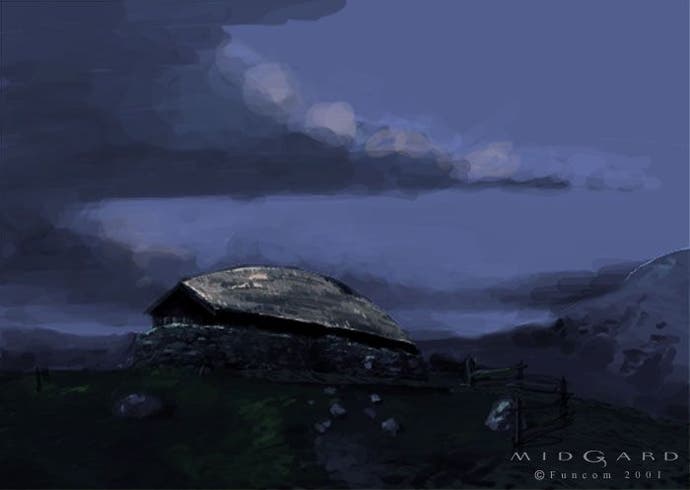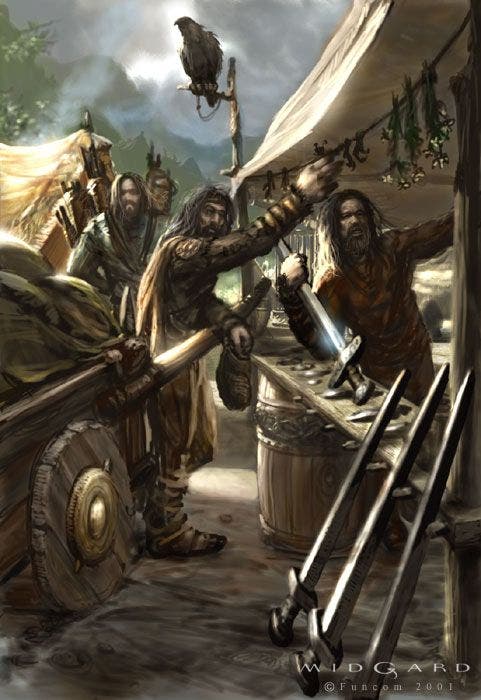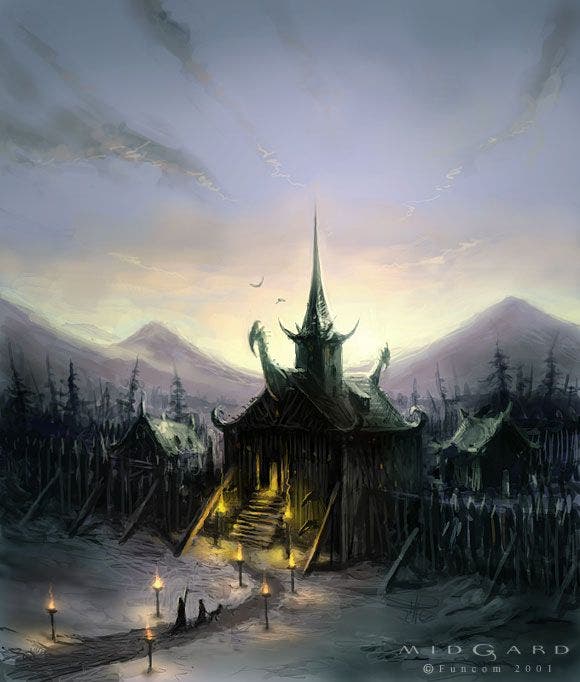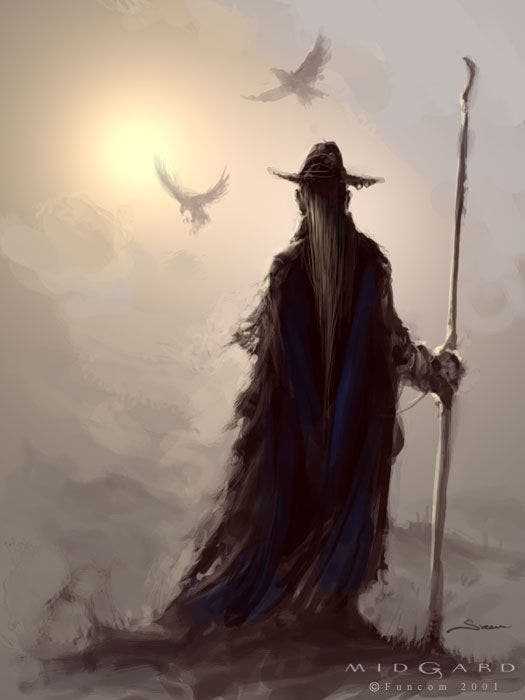Midgard
Preview - our first look at Funcom's innovative Viking-themed massively multiplayer role-playing game
Since the advent of Ultima Online way back in 1997, the massively multiplayer role-playing genre has become increasingly crowded, with dozens of new online worlds expected to launch in the next two years. One of the most promising of these true next generation online games is Midgard, set in a world based on Norse mythology and developed (appropriately enough) in Norway.
We were lucky enough to get a sneak peek at the game during the recent ECTS trade show in London, talking with lead designer Ragnar Tornquist and world creator Sverre Kvernmo about what we can expect from this innovative game.

Born Of Frustration
Although Funcom have already launched one massively multiplayer game, Anarchy Online, the team which is working on Midgard is mostly made up of newcomers to the genre. Ragnar himself is probably best known as the brains behind The Longest Journey, one of the best adventure games of recent years.
"I'm not a big fan of online games", Ragnar admitted. Most current games are slow-paced and repetitive, with most of your time spent fighting monsters or healing your wounds ready for the next battle. But while Anarchy Online is a game very much based around conflict, Midgard puts more emphasis on building things rather than simply destroying them.
The heart of Midgard is the village, and players will have to work together to build up the strength of their home town and gather the resources that it needs. Alliances can be forged and wars waged with neighbouring villages, and as your character's reputation rises you may find yourself becoming a feared Viking warlord or a member of your village council. Players can even form new clans and head off into the northlands to found their own village, creating an entire settlement from scratch.

The Professional
To make your village a success you will need to ensure that you have the right balance of workers and craftsmen amongst your citizens. In all there should be around twenty or thirty professions to choose from, but unlike in most current massively multiplayer games, in Midgard players will be able to switch between different professions as necessary.
Gaining new skills, exploring other jobs and contributing to the well-being of your village will all help to increase your reputation within the game. There are no character levels as such; instead your status depends on your character's "age". The more experience you gain, the more skills you develop and the longer you spend playing the game, the higher your character will rise in Viking society. It should encourage players to take an active role in the development of their village rather than simply having everybody become warriors and go charging off into the nearest forest to battle trolls and giants.
The game's economics will also encourage diversity and experimentation. All items suffer wear and tear, while players require clothing to keep them warm and food to keep them strong. If a village's citizens all decide to become hunters or warriors they will soon run into problems as there will be nobody to replace their damaged weapons and armour. Slowly they will be weakened by the cold and starvation, and at this point smarter players will realise that if they change professions to become a blacksmith or baker they could make a killing selling supplies at inflated prices to hungry half-naked Vikings.
Players can also make a name for themselves through trade skills as well as by fighting monsters. Every item within the game world will record the name of the player who created it and if, for example, you become a master smith you could find your weapons in high demand as your fame spreads across the entire region. Hunters, gatherers and craftsmen who contribute resources and goods to their village store will also see their status rising, meaning that fighting isn't the only way to advance yourself.

Back To Nature
All of this resource gathering has an impact on the world in which you live, and one of the game's main themes is the conflict between man and nature. If you over-exploit the resources around your village it can actually damage the area's ecosystem, reducing the rate at which plants and animals grow back and adversely effecting your village in the process. Nature may also fight back, with animals and monsters emerging from the forests and mountains to attack your settlers.
How players adapt to this challenge will vary. Funcom fully expect some areas to turn into industrial wastelands where villagers strip the surrounding land of resources and then move on to a new location, while other settlements may turn into environmentally-friendly hippy communes living in harmony with nature. Ragnar explained that the idea is to "give players actions and consequences rather than morals", allowing them the freedom to destroy the world in which they live but then facing them with the effects of that on their own well-being.
Another aspect of the game which is sure to spark debate amongst players in some villages is the use of thralls. These bonded servants can be bought from merchants or captured on slave raids against the lands to the south, and used by your village to carry out tasks such as gathering resources or maintaining buildings. Midgard could well be the first online world to include slavery as an important part of the economy.

Valhalla
With Midgard being based on Norse mythology, the gods obviously play a large role in the game as well. Depending on who you worship and how pleased they are with your devotion, your player may earn valuable bonuses. For example, blacksmiths will want to keep Thor happy by providing him with gifts such as ornate swords. Interactions between the gods will also have an influence on life in Midgard, and you may gain additional bonuses if your own patron god is currently on friendly terms with other deities.
One of the most unique aspects of Midgard though is its approach to death. Most massively multiplayer games simply respawn you instantly when you die, although usually with a temporary stats-reducing hangover or a loss of money or equipment involved to encourage you not to get careless. In Midgard though you travel to Valhalla when you die - effectively a huge heavenly kingdom of mead drinking Vikings brawling in the hallways and singing songs about their heroic deeds.
If you were close to your chosen god when you died then you should be able to return to Midgard whenever you are ready. Otherwise you may be called on by the gods to carry out a quest for them to prove your worthiness before you are allowed to return to life. Having said that, we're sure that some players will want to stay on in Valhalla to enjoy the party for a while before going back to their village.
Conclusion
Midgard is shaping up to be one of the more innovative and entertaining next generation online games. With a dynamic world featuring its own economy and ecosystem to abuse, new lands to explore and colonize, and an entire after-life to enjoy after your character has died, it should certainly stand out from the crowd.
Funcom's aim is to provide more flexible gameplay, greater depth and more opportunity for actual role-playing, while keeping the game easy to use. The game is still in the early stages of development and so far we have only seen concept art and tech demos, but if they can pull off even half of what they are promising, they should easily accomplish that. Expect to hear much more about this game over the next year.

.png?width=291&height=164&fit=crop&quality=80&format=jpg&auto=webp)




.jpg?width=291&height=164&fit=crop&quality=80&format=jpg&auto=webp)
